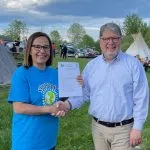
Treaty 4 Education Alliance Championing Language Revitalization
The Treaty Education Alliance held a conference at the Queensbury Convention Centre in Regina on Oct. 20th.
The Treaty Education Alliance provides services to their member nations, by advocating for the advancement of treaty rights education.
On Oct. 20th, the focus was Indigenous language revitalizing, and honouring those who have dedicated their lives to this crucial cause.
Faith Watson, Executive Director of the Treaty Education Alliance shared the importance of this mission, and how overwhelming the support has been.
“Our languages were lost due to the impact of residential schools, and it speaks to the importance and it shows us how important focusing on the needs is for education…. it’s a packed house in there, and we have many people that believe this work is important.” Said Watson.

Photo by Campbell Stevenson
According to Watson, the road to reconcile with Indigenous languages nearing extinction has proved difficult.
In order to reimplement teachings based on Indigenous tradition, culture and language, Watson advocates for a major reform of the education system.
“I think for us to see success, we need to deconstruct the whole idea of education. The Westernized idea of education does not work for us, so just totally deconstructing that and putting it back together in a way that will suit our needs and our culture, our traditions and our languages.” Said Watson.
Amongst the large crowd gathered were speakers who dedicate their lives and work to pursue the renewal of Indigenous languages.
Lorenna Lynn Cote, author, educator and returning to school to pursue her PhD, has been at the forefront of teaching anishinaabemowin for many years.

Photo by Campbell Stevenson
For her, language is essential to Indigenous identity,
“When a First Nation language goes extinct, then so does the culture. And that’s the way of life, beliefs, and history that the language carries within them. They all go away. English is replacing our languages.” Said Cote
During her presentation, Cote provided extensive charts and lsits of Indigenous languages nearing extinction.
Despite large numbers of Anishinaabe communities in Saskatchewan and Manitoba, she spoke on the decline of speakers, and those who practice tradition in their lives.
“Common among First Nations people is the view that language and culture are interwoven and inseparable. Languages and identity are an important component of First Nations culture. Without language, we have no culture.” Said Cote.

